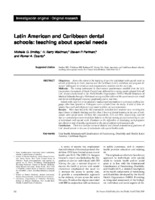Latin American and Caribbean dental schools: teaching about special needs
| dc.contributor.author | Smitley, Michelle G | es_ES |
| dc.contributor.author | Waldman, H. Barry | es_ES |
| dc.contributor.author | Perlman, Steven P | es_ES |
| dc.contributor.author | Ocanto, Romer A | es_ES |
| dc.date.accessioned | 2015 | |
| dc.date.available | 2015 | |
| dc.date.issued | 2009 | es_ES |
| dc.identifier.citation | Smitley, Michelle G,Waldman, H. Barry,Perlman, Steven P,Ocanto, Romer A (2009) Latin American and Caribbean dental schools: teaching about special needs. Rev Panam Salud Publica;25(4) 322-327,apr. 2009. Retrieved from http://www.scielosp.org/scielo.php?script=sci_arttext&pid=S1020-49892009000400006 | en_US |
| dc.identifier.uri | http://www.scielosp.org/scielo.php?script=sci_arttext&pid=S1020-49892009000400006 | es_ES |
| dc.identifier.uri | https://iris.paho.org/handle/10665.2/9861 | |
| dc.format.extent | graf | es_ES |
| dc.format.extent | tab | es_ES |
| dc.relation.ispartofseries | Rev Panam Salud Publica;25(4),abr. 2009 | es_ES |
| dc.subject | Oral health | es_ES |
| dc.subject | International Classification of Functioning, Disability and Health | en_US |
| dc.subject | Latin America | es_ES |
| dc.subject | Caribbean Region | es_ES |
| dc.subject | Salud bucal | es_ES |
| dc.subject | Clasificación Internacional del Funcionamiento, de la Discapacidad y de la Salud | es_ES |
| dc.subject | América Latina | es_ES |
| dc.subject | Región del Caribe | es_ES |
| dc.subject | Assistência Odontológica para Pessoas com Deficiências | pt_BR |
| dc.subject | Educação em Odontologia | pt_BR |
| dc.subject | Escolas de Odontologia | es_ES |
| dc.subject | Região do Caribe | pt_BR |
| dc.subject | Currículo | es_ES |
| dc.subject | Educação em Odontologia | pt_BR |
| dc.subject | América Latina | es_ES |
| dc.subject | Questionários | pt_BR |
| dc.title | Latin American and Caribbean dental schools: teaching about special needs | en_US |
| dc.type | Journal articles | en_US |
| dc.rights.holder | Pan American Health Organization | en_US |
| dc.description.notes | OBJECTIVES: Assess the extent of the teaching of care for individuals with special needs in schools of dentistry in Latin America and the Caribbean (LAC), and deans and program directors' willingness to introduce such programmatic modules into the curricula. METHODS:The survey instrument (a short-answer questionnaire modeled from the U.S. Curriculum Assessment of Needs Project) was delivered to a survey sample gleaned from all LAC dental schools listed in the World Health Organization (WHO) World Directory of Medical Schools through a Web-based survey tool that delivered the questionnaire via e-mail and stored and displayed responses graphically and in real time. Schools with incorrect or insufficient e-mail/contact information or a primary working language other than Spanish or Portuguese were excluded from the study. A total of three attempts (by e-mail and telephone) were made to follow up nonrespondents. RESULTS: More than half of the 142 respondents indicated their students were receiving less than 5 hours of didactic training and less than 5 hours of clinical training in the care of individuals with special needs. Of these 142 respondents, 23 percent and 30 percent, respectively, reported that no curricula hours were needed for didactic or clinical training focused exclusively on care of individuals with special needs. Emphasis on the difficulties in developing such programs was placed on lack of faculty experienced in the care of patients with special needs. CONCLUSION: There is a need for increased didactic and clinical preparation of graduates of LAC dental schools in the care of individuals with special health needs.(AU) | en_US |
| dc.description.notes | OBJETIVOS:Evaluar en qué grado se enseña sobre la atención a las personas con necesidades especiales en las escuelas de odontología de América Latina y el Caribe (ALC) y la disposición de los decanos y los directores de programas de introducir estos módulos en los currículos. MÉTODOS: Se envió una encuesta (un cuestionario de respuestas breves modelado a partir del U.S. Curriculum Assessment of Needs Project) a todas las escuelas de odontología de ALC incluidas en el Directorio Mundial de Escuelas de Medicina de la Organización Mundial de la Salud. Para ello se empleó una herramienta de encuesta en línea que enviaba el cuestionario por correo electrónico y almacenaba y presentaba las respuestas gráficamente en tiempo real. Se excluyeron las escuelas con información de contacto/correo electrónico incorrecta o insuficiente y las escuelas cuyo idioma de trabajo no era español o portugués. Se hicieron tres seguimientos (por correo electrónico y teléfono) a las que no respondían. RESULTADOS: Más de la mitad de las 142 escuelas que respondieron afirmaron que sus estudiantes recibían menos de 5 horas de entrenamiento didáctico y menos de 5 horas de entrenamiento clínico para la atención de personas con necesidades especiales. De los 142 encuestados, 23 por ciento y 30 por ciento informaron que no se necesitaban horas curriculares para el entrenamiento didáctico o clínico, respectivamente, enfocadas exclusivamente en la atención de personas con necesidades especiales. En cuanto a las dificultades para desarrollar estos programas se observó un mayor énfasis en la falta de profesores con experiencia en la atención de pacientes con necesidades especiales. CONCLUSIONES: Se necesita aumentar la preparación didáctica y clínica de los graduados de las escuelas de odontología de ALC en la atención de personas con necesidades especiales.(AU) | es_ES |
Files in this item
This item appears in the following Collection(s)
-
Pan American Journal of Public Health
Revista Panamericana de Salud Pública




